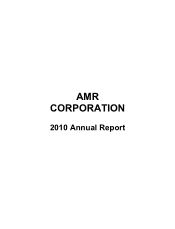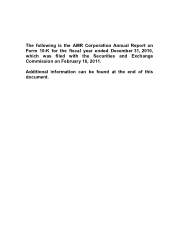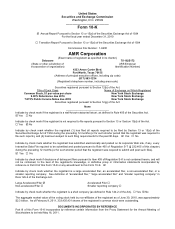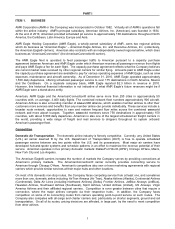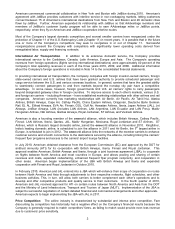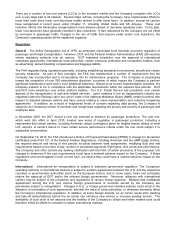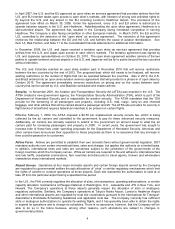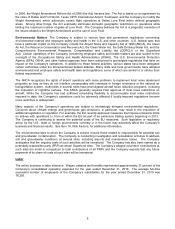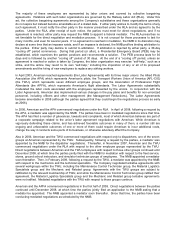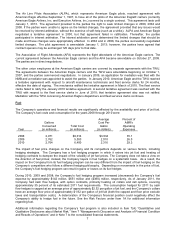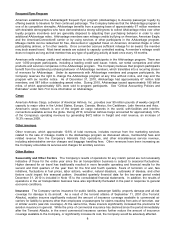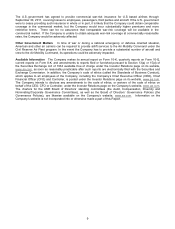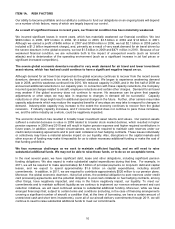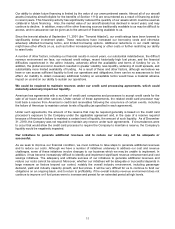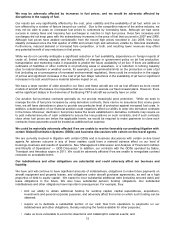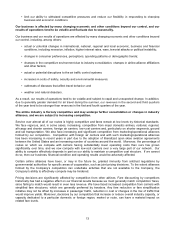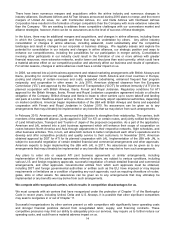American Airlines 2010 Annual Report Download - page 7
Download and view the complete annual report
Please find page 7 of the 2010 American Airlines annual report below. You can navigate through the pages in the report by either clicking on the pages listed below, or by using the keyword search tool below to find specific information within the annual report.4
In April 2007, the U.S. and the EU approved an open skies air services agreement that provides airlines from the
U.S. and EU member states open access to each other’s markets, with freedom of pricing and unlimited rights to
fly beyond the U.S. and any airport in the EU including London’s Heathrow Airport. The provisions of the
agreement took effect on March 30, 2008. Under the agreement, every U.S. and EU airline is authorized to
operate between airports in the U.S. and Heathrow. Notwithstanding the open skies agreement, Heathrow is a
slot-controlled airport. The agreement has resulted in the Company facing increased competition in serving
Heathrow. The Company is also facing competition in other European markets. In March 2010, the EU and the
U.S. committed to the extension of the “open skies” air services agreement. The extension of this agreement
reinforces the relationship between the EU and the U.S. and furthers the cause of aviation liberalization. See
Item 1A, Risk Factors, and Note 11 to the consolidated financial statements for additional information.
In December 2009, the U.S. and Japan reached a tentative open skies air services agreement that provides
airlines from the U.S. and Japan open access to each other’s markets. The tentative agreement was signed by
U.S. and Japanese representatives on October 25, 2010. The open skies agreement enables carriers of the two
parties to operate between any two airports in the U.S. and Japan as well as fly to points beyond the two countries
without restriction.
The U.S. and Colombia reached an open skies aviation pact in November 2010 that will remove restrictions
between the two countries by the end of 2012. The proposed deal, which still needs to be finalized, will remove
existing restrictions on the number of flights that can be operated between the countries. Also in 2010, the U.S.
and Brazil entered into an open skies aviation services agreement that will provide for a phase-in of open skies by
October 2015. The agreement immediately removes restrictions on pricing and on the routes between each
country that can be served by U.S. and Brazilian scheduled and charter airlines.
Security In November 2001, the Aviation and Transportation Security Act (ATSA) was enacted in the U.S. The
ATSA created a new government agency, the Transportation Security Administration (TSA), which is part of the
Department of Homeland Security and is responsible for aviation security. The ATSA mandates that the TSA
provide for the screening of all passengers and property, including U.S. mail, cargo, carry-on and checked
baggage, and other articles that will be carried aboard a passenger aircraft. The ATSA also provides for security in
flight decks of aircraft and requires federal air marshals to be present on certain flights.
Effective February 1, 2002, the ATSA imposed a $2.50 per enplanement security service fee, which is being
collected by the air carriers and submitted to the government to pay for these enhanced security measures.
Additionally, air carriers are annually required to submit to the government an amount equal to what the air
carriers paid for screening passengers and property in 2000. In recent years, the government has sought to
increase both of these fees under spending proposals for the Department of Homeland Security. American and
other carriers have announced their opposition to these proposals as there is no assurance that any increase in
fees could be passed on to customers.
Airline Fares Airlines are permitted to establish their own domestic fares without governmental regulation. DOT
maintains authority over certain international fares, rates and charges, but applies this authority on a limited basis.
In addition, international fares and rates are sometimes subject to the jurisdiction of the governments of the
foreign countries which the Company serves. While air carriers are required to file and adhere to international fare
and rate tariffs, substantial commissions, fare overrides and discounts to travel agents, brokers and wholesalers
characterize many international markets.
Airport Access Operations at four major domestic airports and certain foreign airports served by the Company
are regulated by governmental entities through allocations of “slots” or similar regulatory mechanisms which limit
the rights of carriers to conduct operations at those airports. Each slot represents the authorization to land at or
take off from the particular airport during a specified time period.
In the U.S., the FAA currently regulates the allocation of slots, slot exemptions, operating authorizations, or similar
capacity allocation mechanisms at Reagan National in Washington, D.C., LaGuardia and JFK in New York, and
Newark. The Company’s operations at these airports generally require the allocation of slots or analogous
regulatory authorities. Similarly, the Company’s operations at Tokyo’s Narita Airport, London’s Heathrow Airport
and other international airports are regulated by local slot coordinators pursuant to the International Air Transport
Association’s Worldwide Scheduling Guidelines and applicable local law. The Company currently has sufficient
slots or analogous authorizations to operate its existing flights, and it has generally been able to obtain the rights
to expand its operations and to change its schedules. There is no assurance, however, that the Company will be
able to do so in the future because, among other reasons, such allocations are subject to changes in
governmental policies.

